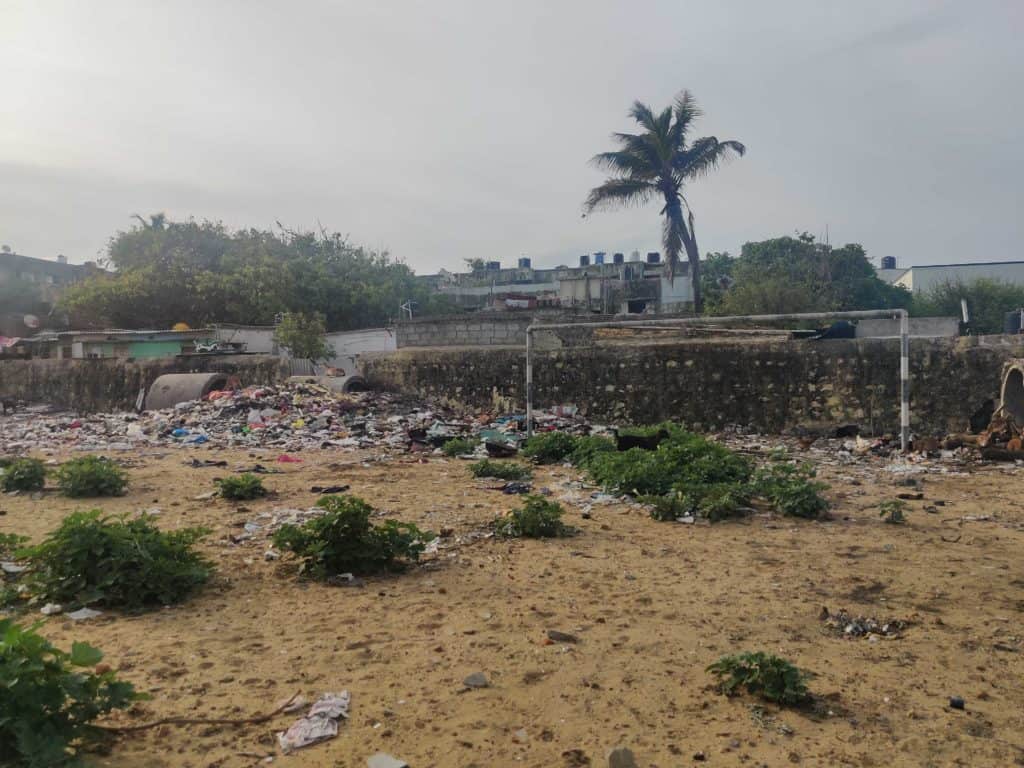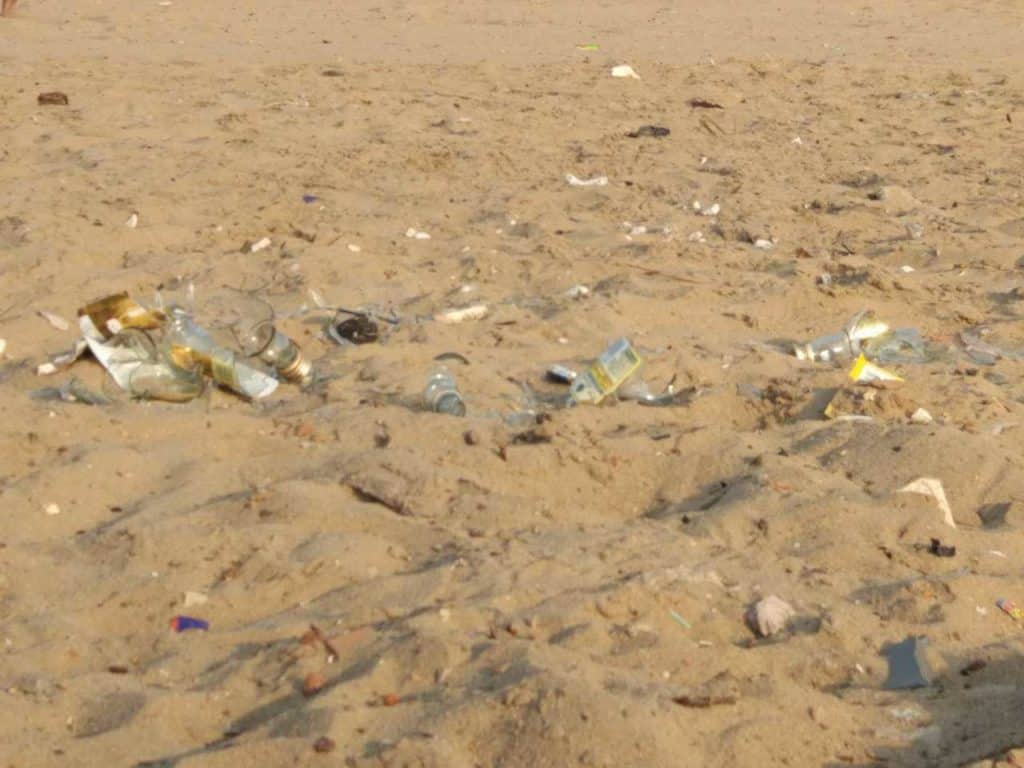“We don’t want to do this but it’s not like we have a choice”, said Kannika* on having to use the playground near her home to relieve herself due to the lack of proper sanitation facilities in the vicinity in Doomingkuppam.
This is the reality for many who reside in the area despite having lived in the city for decades. The many rows of huts that dot the area opposite the scenic beach do not have proper toilets, forcing residents to defecate in the open.
Doomingkuppam residents await toilets
Doomingkuppam is home to many from the fishing community, with their lives intertwined with the sea. Their main source of income is the sale of the daily catch from the sea. For which families have set up small stalls along Loop Road.
Many here remember the tsunami with grief, speaking of how they lost loved ones and whatever little they owned in the tragedy. The rehabilitation efforts involved the building of pucca houses close by to house a majority of the families from Doomingkuppam and the Nochi Nagar area. However, not all residents call these tenements home. Many continue to live in thatched huts, homes with tin roofs and makeshift shanties across from the beach.
It is these residents whose demands for better sanitation facilities have gone unheeded.
“We have tried to get the authorities’ attention on this but are also afraid of eviction. We don’t want to be moved from here so we try to live with whatever facilities are available”, says Karpagam S, a resident.
“In the past our local politicians have promised us sanitation facilities but nothing materialised. We did not have a councillor to make these demands to until recently. Kamal’s party (Makkal Needhi Maiam) promised us toilets if elected in the last assembly elections but their candidate did not win”, said Valiammal*, a Doomingkuppam native.
Read more: Coming soon: A map and masterplan for Chennai toilets
Open defecation the only option for many
So what do the residents of the area do? Mornings at the Santhome beach playground see groups of women and young children make their way to the more secluded areas of the ground and relieve themselves behind the shrubbery. They carry small pots of water to wash up and use the sand in the ground to cover up the waste.

“I have become used to this. We are a huge family and the toilet at home is out of order so I come here every morning. The public toilets are either not close by or not well-maintained. We come here as a result. I hope things can change soon and we can get the toilet functioning again so I don’t have to come here”, said Santhiya V, a resident.
Most of those who use the ground complain of a lack of usable public toilet facilities that would prevent such a situation. “ The number of people in the area necessitates an increase in number of toilets, especially those that can be used by women and young girls. There are more facilities closer to the beach for the visitors, than for those who have been residing here for so long”, said Menaga K
Even those more reluctant to discuss their reasons for using the ground spoke up for better facilities. A resident, Latha* said, “I hope the next generation will at least not have to endure what we have to, for the simple act of using a toilet.”
Playground as a contested space
“We would like to have the ground back to play. We are currently using the beach but it is not the same” said, Santhosh. “The beach has broken liquor bottles dumped or sometimes buried in the sand. Many of us have hurt ourselves playing there. Also, the surface is not even and there are no nets.”

A fallout of the use of the playground by the residents as a makeshift toilet has been the end of all sporting activities that used to take place there. One All, a sport for development organisation working in the area elaborates.
“We conducted our life skills training program through Frisbee sessions for the children by the beach. Then we were informed that the ground was available for use but when we tried to use the ground for the sessions there the ground doubling up as a toilet for the local community became an issue. Despite cleaning the area up daily there were issues with hygiene and the children were not keen on using the ground anymore. So we had to shift the sessions back to the beach”, said Ganesh Moorthi, facilitator at One All.
The playground is a piece of land that is privately owned and belongs to a family who resides in Leith Castle area. The residents of the area say that there has not been any maintenance in recent times and since the land is privately owned they have not been able to improve the situation. There is garbage and overgrown shrubs and bushes dot the ground that once used to see a lively crowd of young children from the area thronging it during their free time.
The ground has now become a symbol of the sanitation issues that plague the residents there, with unhappy children and adults demanding more toilets.
Read more: Opinion: What can make Singara Chennai 2.0 better than 1.0?
How can sanitation issues of Doomingkuppam be fixed?
To achieve Open Defecation Free (ODF) certification under the Swachch Bharat Mission, a city has to have not a single person defecating in the open at any point during the day. Chennai is far from achieving this mission as evidenced by the daily struggles of those in Doomingkuppam accessing safe sanitation facilities.
The Greater Chennai Corporation (GCC) own or maintains 853 public toilets across all locations of the city. But the maintenance of many of the facilities leaves a lot to be desired. The civic body has recently called for an expression of interest to outsource the maintenance of the toilets across the various wards. There are also plans to construct additional toilets under the Singara Chennai 2.0 scheme with an outlay of Rs 221 crore.
“We have been told that those living in makeshift houses will also be provided with a pucca house in the tenements under construction in the area. Once we move there we will have toilets of our own. Hence we have not made any demands at present”, said S Mary.
On raising this issue, an official from the Greater Chennai Corporation retreated, “The residents will be moving to the pucca houses. We will also be building more toilets across the city and ensure this area is covered.”
When the families who have been notified of the move would actually shift to the tenements is a question they do not have an answer to.
With no other developments in sight, the residents continue their daily march to the playground every morning even as they hope for toilets in their own homes sometime in the future.
[*Names changed on request]